Patmos: The Island We Love to Return to
Charming architecture, unique beaches, rich history,...
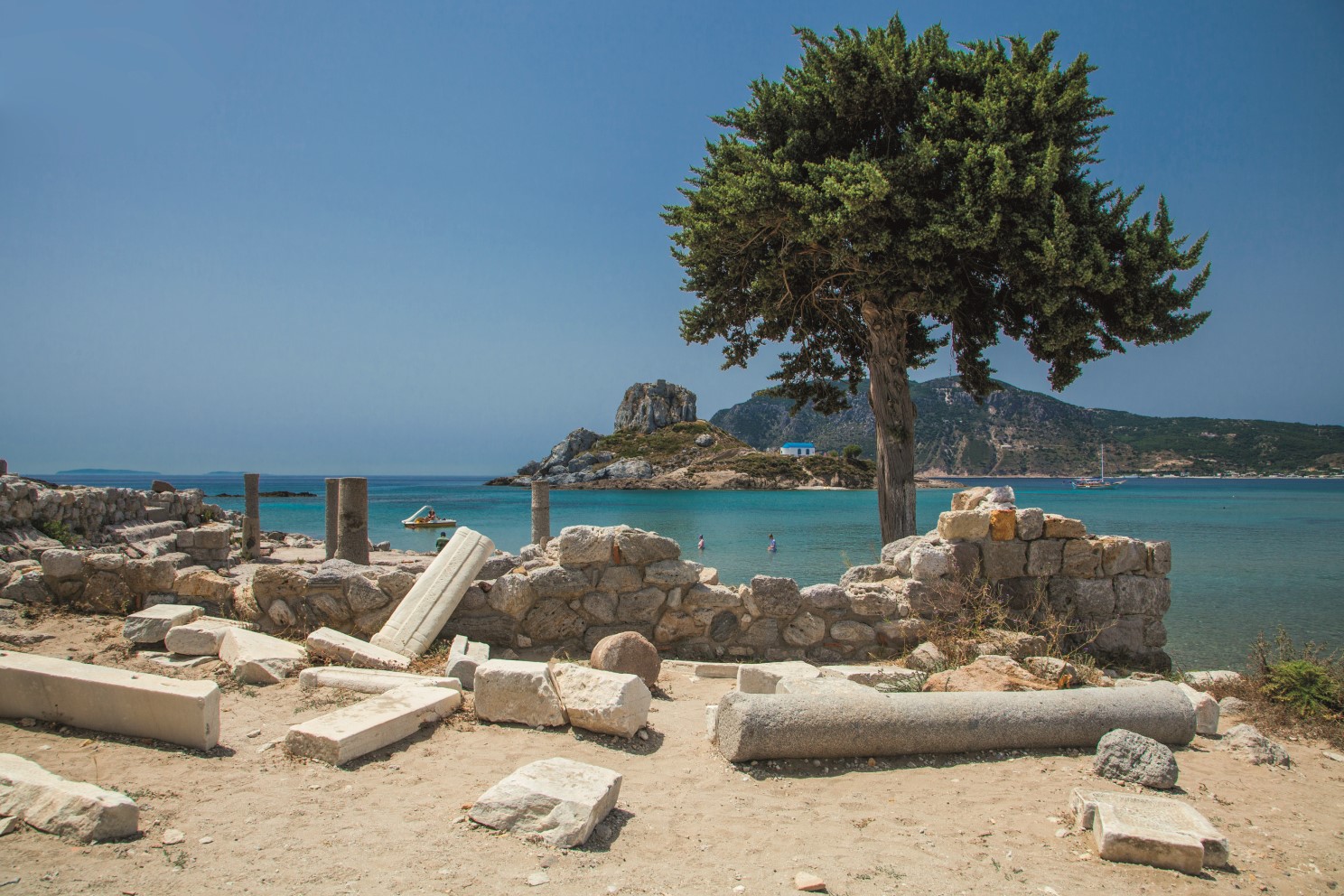
The early Christian Church of Aghios Stefano on the beach of the same name in Kefalos.
© Olga Charami
On Kos, you don’t need to lose sleep over sun lounger reservations. Instead, simply unfold your map and pick a beach to lay your towel.
In town, there’s no need to worry about parking; you can get anywhere safely by bicycle. And it’s perfectly fine to just let yourself be free, doing whatever strikes your fancy.
While enjoying a beer next to the Municipal Market, you can put your glass down for a moment to join the kids playing soccer in the square and using the bollards for goalposts.
So what if your shirt is stained with sunscreen and your sandals are still sandy? It’s your an accepted right to go about your business “with the sea salt on you.”
You can, if you want, go straight from the beach to the Orfeas Open Air Cinema and then on to Mylos Beach Bar to dance till dawn.
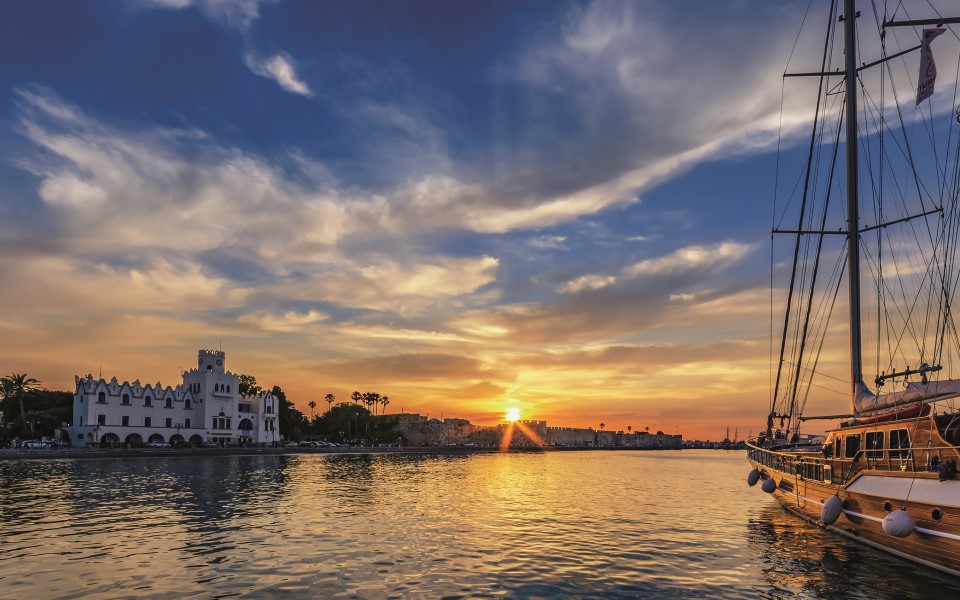
The sun sets behind medieval Neratzia Castle; on the left stands the Palazzo del Governo.
© George Papapostolou
A visit to the ancient monuments can be fun, especially if you prepare by reading a guide to the sites.
In the evening, you can stroll to Neratzia Bridge, and, with all the chivalry of a modern-day Knight of St John, offer the object of your affection a strawberry sherbet before stealing the taste from their lips.
You can look around the Ancient Agora, reflecting on the thought that Hippocrates believed food to be the best medicine, then head for the seafood district beyond the offices of the Public Power Corporation in the port.
If you’re a fan of creative delicacies made with local ingredients, or if you like your cocktails in a cosmopolitan atmosphere, you should definitely go to Barbouni, run by the Ediaroglou family from Thessaloniki.
For shellfish and grilled fish, go across the road to one of the best fish tavernas in the Dodecanese, Nick the Fisherman.
The next morning, while snacking on some bougatsa (custard pie) from Ariston, you can pick an event from the Hippocratia Festival program, which this year will feature local artists, and talk about how quickly the time passed the night before.
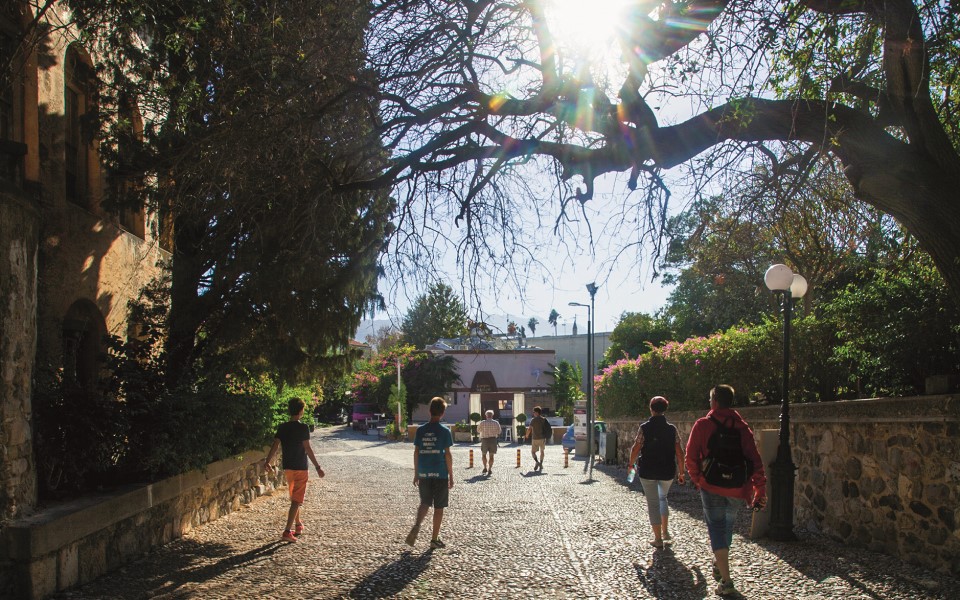
Kos Town is the perfect place to spend a day strolling past sights such as the Plane Tree of Hippocrates.
© Olga Charami
It is precisely this magical simplicity that allows you to have fun without any tedious planning, and this reveals the true meaning of Greek summer: a liberating spontaneity.
In the last five years, despite complications brought on by the migration crisis and the 2017 earthquake, the island of Hippocrates has begun to shift away from the monoculture of “all-inclusive” package tours, which deterred Greek tourists.
The island has started to build a new identity centered around elements such as fine dining, which had not been a priority for decades; farming and local food production, which enriches hotel breakfast tables and municipal market stalls alike; and a revived respect for the principles of Hippocrates.
And, of course, its legendary beaches, which remain one of Kos’ key advantages.
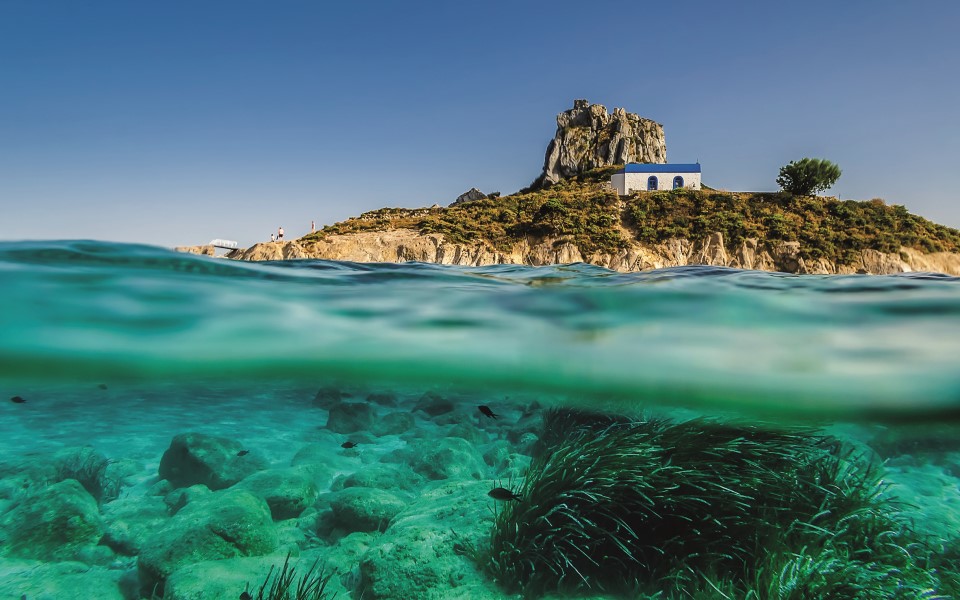
You can swim from Aghios Stefanos Beach to the islet of Kastri, with its little Church of Aghios Nikolaos.
© George Papapostolou
Late at night, a moonlit walk over volcanic rocks will bring you to Therma Beach, with its black pebbles.
There is a special place in the sea here where the water’s surface appears covered in gold dust. It is an optical illusion created by sulfur, from the local hot springs, glowing in the dark.
Here, 13km southeast of Kos Town, you can enjoy a unique natural spa, ideal for relaxing your body and for acquiring – at least temporarily – skin like alabaster. For more privacy, go in the early morning or late at night.
Aside from the singular experience of Therma, Kos boasts a breathtaking coastline with beaches for all tastes, from long golden sandy stretches to well-hidden coves for skinny-dipping. At Alykes, or Tigaki, you can lie on the sand with your feet in the warm sea, while the sun reddens before setting behind Kalymnos.
At Cavo Paradiso, beyond Kefalos, it’s fun to play in the waves and lose yourself in the turquoise waters, while at Aghios Stefanos, you can swim to the islet of Kastri or spend time exploring ruins of early Christian churches.
Polemi Beach is a sandy expanse so long and broad that it seems as if it were created expressly for social distancing.
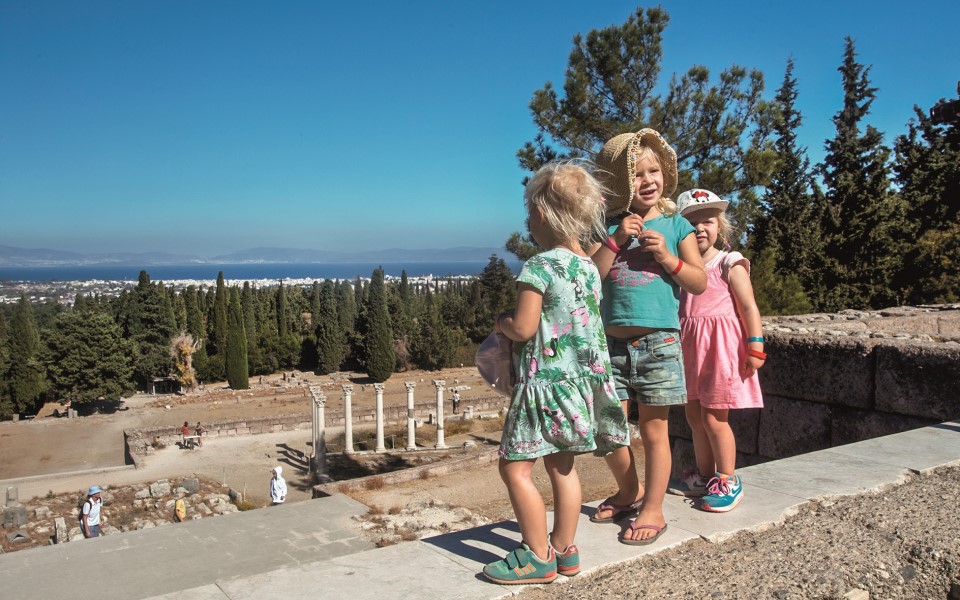
The Asklepieion is an attraction for all ages!
© Clairy Moustafellou
With 5,000 years of recorded history and multiple occupiers over the centuries, Kos boasts the traces of many different civilizations, today all existing in harmony.
This power to combine seemingly disparate elements, an integral part of the island’s DNA, is what makes a vacation on Kos an adventure of perpetual exploration.
In the main town, within an area measuring barely a square kilometer, you’ll find a Roman theater; the Roman house known as the Casa Romana; the Altar of Dionysus; the Municipal Market (built by the Italians in 1933), with its impresssive central atrium; the Italian Palazzo del Governo (Government House) on the seafront with its characteristic towers; the Defterdar Mosque, dating from 1780; and the charming Kos Aktis, formerly the hotel Xenia, which first opened its doors in 1960 and underwent a full renovation in 2005.
Whenever I visit Kos, I often take refuge on one of the hotel’s balconies to plan a walk or bike ride among the city’s many sites, which form an open-air museum, or to decide on an expedition further afield.
Once I’ve solved a now familiar dilemma and made a choice between the Hatziemmanouil Assyrtiko and the Triantafyllopoulos Chardonnay (both wineries are open to the public and offer tastings), I gaze for a while on the distant lights of Halicarnassus (today known as Bodrum) and the boats coming and going from the marina below, before closing my eyes and letting my pencil fall on the map.
Wherever the pencil lands, I know it will be worthwhile. Even so, I often cheat and, with half-closed eyes, steer the pencil towards the mountain village of Asomatos in the Asfendiou region. I have become addicted to lounging on the terrace of the cafe Kazino drinking cool wine in the afternoon.
Then, later on, I watch the sky change color through the stone archway of the church next door.
Charming architecture, unique beaches, rich history,...
Six Athenians tell us about their...
With fewer tourists, sunlit harbors, and...
A challenging summer ride across the...